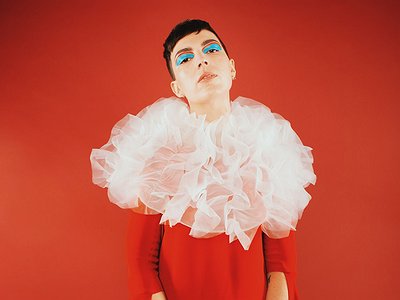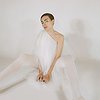Part 2
Could you describe your creative process on the basis of a piece or album that's particularly dear to you, please? Where did the ideas come from, how were they transformed in your mind, what did you start with and how do you refine these beginnings into the finished work of art?
I’ve already touched upon this in a previous question, but the process was very organic in that a lot of the musical content was inspired by nature sounds. On top of having the sounds of birds and nature guide the beginning process, I was also composing it for a contemporary dance company, so the compositions had to have the ability to be ‘easy to move to’ in a way. The original idea for ‘Further’ though came from a mixture of wanting to create something as an ode to nature and a piece of poetry by Emily Dickinson- a poem called ‘Further in Summer Than the Birds’. The way that the poem describes nature, coupled with the archive of nature sounds I have, created the perfect match. In the case of this particular body of work, I knew that the length of it had to be somewhat brief, so instead of having that inhibit me I actually leaned into it and it allowed for me to be freer in form and have each movement act as more of a statement rather than need any sort of traditional structure. There’s no particular reason why it’s six movements, but rather it happened because there were six sounds that caught my attention that I wound up using and basing each movement after.
As to how to refine these conceptual ideas into a finished piece once some of the sonic pieces are in place. I will often then sit at the piano and just record myself playing ideas freely with no metronome, etc. Most of the time I will end up with really long takes, but there’ll always be something in there that I like and end up expanding on.
There are many descriptions of the ideal state of mind for being creative. What is it like for you? What supports this ideal state of mind and what are distractions? Are there strategies to enter into this state more easily?
I’m not sure I have only one ‘ideal’ state of mind. When composing, I feel as though I have two different states of mind that come about depending on what I’m trying to do. When working on a film project/commission, I will often need a lot more time to procrastinate and let the project marinate. The actual ‘work’ in this case will sometimes take less time than the time spent ‘thinking’ about it. I’m still learning but have gotten pretty good at being able to turn on that particular state of mind.
On the flipside, when it comes to my own music and personal creativity, I feel that it’s less about procrastination and more about being impulsive. So often the best material and pieces I’ve written have come from a flash of an idea that I was able to capture. When I purposely try to sit down and get into this more creative state of mind, I often fail unless I have completed specific tasks on whatever ‘to do’ list I have lying around. Nearly as though I need to have a clear mind to be able to let other ideas in. These most recent times have allowed for a lot of that clear minded time to be honest, which is surprising and interesting.
How is playing live and writing music in the studio connected? What do you achieve and draw from each experience personally? How do you see the relationship between improvisation and composition in this regard?
Playing live for me is endlessly inspiring! Ever since I’ve started including improvisation into my sets, I’ve found that I’ll have happy accidents when performing that will in turn become their own piece. Recently, a lot of the elements I pull together for videos as part of my series #liveambientimprov will wind up becoming pieces that I either record or that become staples in my live sets. The relationship between these improvisations and my studio work is really symbiotic and one couldn’t live without the other.
When working on film/tv work, though, I often don’t have as much time to use improvisation as a way of composing, as the deadlines don’t allow for as much experimentation as when I’m composing my own work. The technique that I described earlier though, of just recording anytime I sit at the piano, is rooted in improvisation and will often provide breakthroughs with my film/tv work as well.
How do you see the relationship between the 'sound' aspects of music and the 'composition' aspects? How do you work with sound and timbre to meet certain production ideas and in which way can certain sounds already take on compositional qualities?
To me these two aspects are one of the same, sounds are composition in my work. An aspect of sound creation that interests me and is incorporated into my compositions are sounds whose tonal center are not necessarily easily identifiable such as percussion and textured noise. In a composition I’ll sometimes use elements of sound that are unexpected and don’t really ‘fit’ in terms of tonality to create tension and set a certain type of ambiguity. There’s no bigger compliment than when someone comments positively on a specific sound or element of my music, not realizing that it is for example a field recording of cicadas (as is the case with my track ‘ae’) or a sample of a crane pitched (‘Crane Song’ from Further).
Our sense of hearing shares intriguing connections to other senses. From your experience, what are some of the most inspiring overlaps between different senses - and what do they tell us about the way our senses work? What happens to sound at its outermost borders?
Ah what a great point the senses are so interconnected! I feel an extreme connection between sight and sound, which is what has allowed for me to work with visual mediums for the last handful of years. Music/sound have always been connected to some sort of visual stimulus, whether it is a film, photograph or a personal experience. I find that our sight can be amazingly heightened by the sense of hearing, and the power of sound in visual instances is uncanny.
A while back, I actually got into reading a lot about the intersection between hearing and taste when I came across the work of Charles Spence. It’s a fascinating concept to think that what we hear while eating something could have a big impact on the taste and experience. It makes complete sense though- how often has the taste of something or the smell of something reminded us of an experience?
Art can be a purpose in its own right, but it can also directly feed back into everyday life, take on a social and political role and lead to more engagement. Can you describe your approach to art and being an artist?
I wish I had a more profound answer for this, but as it is for many people, for me art is a way to connect, express and analyze life. Unless what I’m composing has a direct link to a cause, most of the time my approach to art is from a place of needing to musically vent and get something out of myself, whether it’s negative or positive. In a way, the live improvisations that I do (#liveambientimprov) will often have a more direct socio-political awareness to them as I try to perform and compose those often, and will often release them with a specific experience in mind (i.e. ‘Wildflower’, released on this past Earth Day, was a way to alleviate collective stress from the pandemic).
Anything I release has a very specific concept that I tend to explore way beyond the music itself. This will lead to things such as creating a visual score book for my record ‘semi songs’, which was brought to life by designer/artists Jeremiah Chiu. For any release I’ll always try to envision what the artwork will look like; what the images and videos I want to share about it is, etc.
With my tv/film work the approach is a little bit different as your music is helping fulfill someone else’s vision. At that point it becomes a matter of putting ego aside and composing/creating the best possible musical character for a specific project, and as an artist becoming the medium between the director/showrunner and the music.
It is remarkable, in a way, that we have arrived in the 21st century with the basic concept of music still intact. Do you have a vision of music, an idea of what music could be beyond its current form?
I have read many articles about how Artificial Intelligence will possibly change the way we write and consume music, but I find myself somewhat skeptical about its effectiveness. Beyond that, I think that rather than the concept of music changing, what would be amazing to see is a change in the way we consume music. Meaning getting to experience recorded music in 3D for example, in format such as binaural, ambisonic or surround above 5.1. I think that visually we’ve evolved so much in the way we experience the world, but sonically we have yet to push beyond conventional stereo and low fidelity music. I’ve also been curious to see whether there will be a shift to different tonalities and tunings, but there would need to be an openness from the music industry as a whole which I don’t see happening anytime soon. At least not on a bigger scale.






